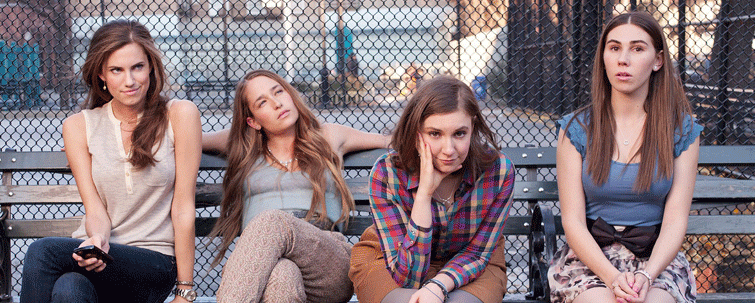February sees Lena Dunham, creator of the hit HBO show Girls, grace the cover of American Vogue.
February sees Lena Dunham, creator of the hit HBO show Girls, grace the cover of American Vogue. Last week, the photos to be used as part of the cover story were released by the magazine and within a few days, website Jezebel published the ‘untouched’ photographs from the shoot on their website.
In an article stating how it took ‘only’ $10,000 (£6,032) and two hours to gain access to these altered photos, Jezebel put emphasis on the alterations made to Dunham (and co-star Adam Driver) including the thinning of her neck and the removal of the bags under her eyes.
Jezebel’s aim, it must be assumed, was to point the feminist finger at Dunham—to condemn her for allowing the altered pictures to be those used for publication. Jennifer Lawrence suffered similar criticism last month over some altered photos that were published in Flare magazine for her 2011 cover shoot.
Dunham’s message
In the cases of both Dunham and Lawrence, it could be that it is easier to accuse them, compared to the average actress, of being, in a sense, hypocritical by allowing retouched photos of themselves to be published.
Lawrence is known for promoting a positive body image and condemning the use of the word ‘fat,’ while the semi-autobiographical world of Girls created by Dunham presents a daringly raw view of life in New York for a group of young women.
Surely, therefore, it should be that their dedication to a ‘real’ image stretches even as far as to the front of the most prestigious fashion magazines?
Dunham did not seem phased by the altered Vogue photos and tweeted them along with a “thank you” message to the magazine.
Just want to say a little thank you to everyone who supported me just as I am, most especially @voguemagazine xo-Lena
— Lena Dunham (@lenadunham) January 18, 2014
Following Jezebel drawing attention to the alterations in such a public manner, Dunham thanked Vogue Magazine again via her Twitter for “supporting [her] just as [she] is,” suggesting (or confirm-ing something we all already knew) that there is far more to Lena than how slim her neck is made to look for the cover of a magazine.
Actor Jim Carrey also publicly commented on the retouched photos through his Twitter, comparing the edited photos to people who wear makeup or brush their teeth.
Any1 upset by Lena Dunham being retouched in Vogue should stop using makeup n toothpaste. It sets an unnatural standard of fresh breath! ;^¥
— Jim Carrey (@JimCarrey) January 20, 2014
Although it’s hoped that no one would take this seriously enough to stop brushing their teeth – for all our sakes – he does make an interesting point about how we falsify our own images on a daily basis because the ability to do so is within our grasp; why should we then condemn Vogue or Dunham for essentially doing the same thing?
Appreciated as an artist
Dunham has since stated in a Channel 4 interview that Vogue “can’t kill Hannah [Horvath] off.” The character, played by Dunham in the show, has been described by Dunham as someone who she, in some ways, “intensely relates to.”
It is Hannah, and the creation of her imperfect world, who assisted in bringing Dunham to a level of fame where it is felt that she deserves to be on the front cover of Vogue—showing many that even in this day and age as a woman like those featured on the show – those dissatisfied with their jobs, their apartments and their sex lives – you can still reach a stage where you are appreciated on a wide scale as an artist.
So then, do the published photos matter? Altered or not, Dunham’s presence on the cover of Vogue, along with everything she stands for, is not altered.
At a time where Verily – a magazine specifically created not to include any photoshopped pictures – exists, we are reminded constantly of how easy it is for the media to present us with false images. This, it seems, is what Jezebel has tried to achieve with their petty article, which reads more like something from Mean Girls rather than a promotion of feminism. In fact, actress Melanie Lynskey via her Twitter stated that, as a feminist, the article was “ridiculous.”
Hey, Jezebel. This is ridicu-lous. xoxo, a feminist RT @Jezebel: Lena Dunham re-sponds to unretouched images from Vogue http://t.co/YFEgamAwXP
— Melanie Lynskey (@melanielynskey) January 17, 2014
When looking at the lengths Jezebel have gone through to run this story, an awareness of the ri-diculousness is unavoidable. It should not make a difference how good or bad, perfect or realistic, Lena Dunham looks on the front cover of February’s Vogue. It is a statement in itself that she is featuring on the cover, not as a model, but instead as an intelligent and witty woman famed for her acting, writing and directing.
Alterations or no alterations, you go Lena!
What do you think? Should the altered photos have been published? Have your say in the comments section below.
Image: david_shankbone / Flickr









